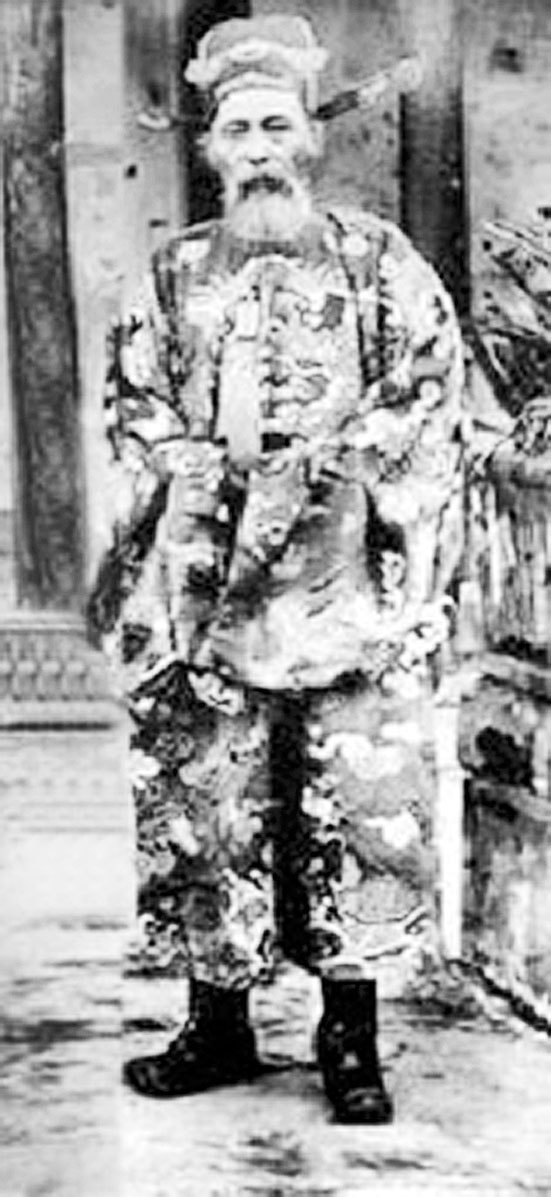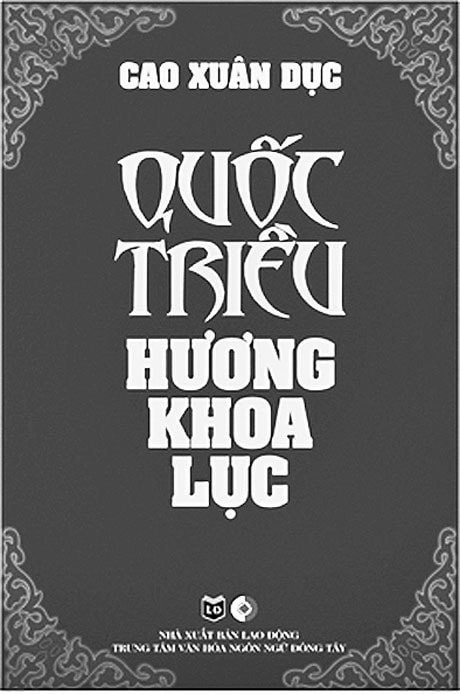The Nghe An cultural figure received a royal poem from King Khai Dinh.
Cao Xuan Duc was a famous scholar in the reign of King Duy Tan, with the name Tu Phat, the alias Long Cuong, from Tinh Khang commune, Dong Thanh district, Dien Chau prefecture, Nghe An province. In 1877, he passed the bachelor's exam, became Minister of Education, General of the Historical Institute, and had the title An Xuan Tu. He was a historian, an excellent and influential local researcher of the country. He left behind many valuable books of his own and also contributed to editing many important official histories of the Nguyen Dynasty.
(Baonghean) -Cao Xuan Duc was a famous scholar in the reign of King Duy Tan, with the name Tu Phat, the alias Long Cuong, from Tinh Khang commune, Dong Thanh district, Dien Chau prefecture, Nghe An province. In 1877, he passed the bachelor's exam, became Minister of Education, General of the Historical Institute, and had the title An Xuan Tu. He was a historian, an excellent and influential local researcher of the country. He left behind many valuable books of his own and also contributed to editing many important official histories of the Nguyen Dynasty.
Presently, many woodblocks edited by him and books written by him are preserved at the National Archives in Da Lat, including: Dai Nam Thuc Luc, De Nguoi Ky; Dai Nam Thuc Luc, De Luc Dai Nam; Quoc Trieu Chinh Bien Toat Yeu; Dai Nam Nhat Thong Chi; Kham Dinh Dai Nam Hoi Dien Su Le Tuc Bien; Nhan The Tu Tri. In addition, he also directly compiled books: Quoc Trieu Huong Khoa Luc, Quoc Trieu Dang Khoa Luc; Dai Nam Chinh Bien Liet Truyen. The woodblock books with Cao Xuan Duc's mark in the Han Nom archives have contributed to the Nguyen Dynasty's woodblock block with original document value.
Dong Cac Grand Scholar Cao Xuan Duc (Photo taken in 1907) and the book Quoc Trieu Huong Khoa Luc compiled by him.
Among them are books recording Vietnam's sovereignty over the sea and islands such as Dai Nam Thuc Luc, Dai Nam Nhat Thong Chi... providing a lot of authentic information for scientific research. In addition, he also established an ancient book warehouse in Nghe An called Long Cuong, where he stored ancient books collected during his time as an official, hired people to copy them into many copies to preserve for posterity. Besides, he also left behind Chinese-Nom poetry and literature collections such as Long Cuong Thi Thao; Long Cuong Lien Tap; Long Cuong Lai Ha Tap... His contribution to the country's history is extremely great and according to the assessment of Professor Chuong Thau: "Cao Xuan Duc can be considered a great cultural figure in our country in the late 19th and early 20th centuries. As head of the Ministry of Education and History, he directed and participated in compiling with a number of scholars in these two agencies many books on history and geography".
As someone who contributed to the compilation of tens of thousands of pages of history, geography, philosophy, etc. books of the Nguyen Dynasty and personally compiled the National Dynasty Huong Khoa Luc and the National Dynasty Dang Khoa Luc, Cao Xuan Duc's position in the National History Institute was very important. Although he was only a bachelor, not having a high degree like the scholars of the time, he was fortunate to be the Chief Examiner of the Ha Nam Huong Exam (1894), then the General Director of the National History Institute, and finally the Minister of Education.
After his death, he was commented in the “Dai Nam Thuc Luc Chinh Bien” (7th period) of King Khai Dinh’s reign that: “Xuan Duc was famous for his literature, serving as an official from the Governor General to the Minister of Education, the Grand Minister of Education, and the Chief of the National History Institute. He had many works such as the books Quoc Trieu Huong Khoa Luc, Quoc Trieu Khoa Bang Luc, Dai Nam Nhat Thong Chi, and Nhan The Tu Tri. When he was old, he was promoted to Dong Cac Dai Hoc Si, and then died. When the King heard the news, he said: “Cao Khanh participated in the affairs of the court for many years. In his old age, he enjoyed a long life. In the five years of human life, he had three blessings, which is truly rare in the world. Now at home, he unfortunately passed away, I am very sorry. I approved the posthumous title of Thieu Pho Cap Tuat Ban Te as usual.”
King Khai Dinh himself gave a royal poem to Cao Xuan Duc: In the basin of fame and fortune, I have been wandering around/ For several years, the birds have been tired and bored of the east and west/ At an old age, I have become famous as an old man/ With white hair and flags flying like an old man, I leisurely drink wine/ The wind and moon recite with the pine clouds/ A few words of the imperial edict, you should remember/ Even if the path to longevity is far away, I still hope.
Nowadays, the Nguyen Dynasty woodblocks are national assets and international documents, in which there is a part of the effort of the talented Nghe An culturalist and historian Cao Xuan Duc in compiling the country's national history.
Nguyen Huy Khuyen (Faculty of Oriental Studies, Dalat University)






